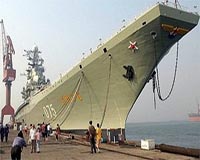| . |  |
. |
London (UPI) Apr 28, 2011 The cost of Britain's new aircraft carriers is set to rise yet again on a decision to make them compatible with a different version of a U.S. fighter jet. The price for the new carriers will increase between $1.7 billion and more than $3 billion because of the British government's decision to make them fit for launching the Lockheed Martin F-35 Lightning II, also called Joint Strike Fighter, the BBC reports. The carriers are to be outfitted with catapults and traps to accommodate the naval version of the JSF instead of the more expensive vertical takeoff and landing version London initially planned to buy. Converting one or both carriers to accommodate the cheaper JSF will drive down operational costs and enhance the vessels' capability and interoperability with Britain's NATO allies, a spokesman for Britain's Defense Ministry told the BBC. Built by a consortium including BAE Systems and Babcock International from Britain as well as France's Thales, the two carriers would now cost a total of $11.7 billion, the BBC says -- more than the $8.7 billion announced by London last fall and a far cry from the $6.5 billion disclosed at the contract signing in July 2008. London didn't want to confirm those numbers. "Final costs are yet to be agreed and detailed work is ongoing. We expect to take firm decisions in late 2012," the Defense Ministry spokesman told the BBC. The carriers have been controversial because of their high costs at times of budget austerity. BAE Systems had pleaded with the government not to scrap the carrier program, citing the loss of jobs and high costs linked to such a move. The government last October decided that it would build both carriers with the first, the HMS Queen Elizabeth, to enter service with the British navy. Once the second carrier, the HMS Prince of Wales, is built, it is to be mothballed or sold to a third country. The announcement was made as part of the country's first strategic defense review in more than a decade. British Prime Minister David Cameron said his government would cut defense spending by 8 percent, reduce troop numbers by 17,000 to 158,500, scrap defense equipment such as airplanes, tanks and artillery and ax 25,000 civilian jobs in the Defense Ministry.
Share This Article With Planet Earth
Related Links Naval Warfare in the 21st Century
 China to launch carrier in 2011: Taiwan spy chief
China to launch carrier in 2011: Taiwan spy chiefTaipei (AFP) April 25, 2011 Taiwan's spy chief on Monday said China could bring its first aircraft carrier into service before the end of the year, kindling fears in Taipei over Beijing's continued naval build-up. Tsai Teh-sheng, head of the island's National Security Bureau, said the "Varyag" a half-completed Soviet era aircraft carrier Beijing obtained from Ukraine in 1998, is expected to make its maiden voyage befor ... read more |
|
| The content herein, unless otherwise known to be public domain, are Copyright 1995-2010 - SpaceDaily. AFP and UPI Wire Stories are copyright Agence France-Presse and United Press International. ESA Portal Reports are copyright European Space Agency. All NASA sourced material is public domain. Additional copyrights may apply in whole or part to other bona fide parties. Advertising does not imply endorsement,agreement or approval of any opinions, statements or information provided by SpaceDaily on any Web page published or hosted by SpaceDaily. Privacy Statement |